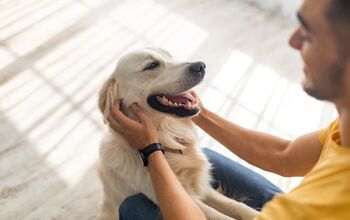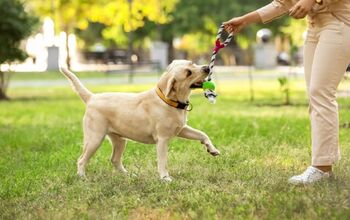Dog Parents Assume Signs of Disease Are Signs of Aging

Being able to recognize the signs of illness in your dog is important, as it can help you get them the care they need sooner rather than later. But, according to researchers at the University of Liverpool, it’s common for pet parents to look at changes in their dogs and assume they’re merely related to normal aging rather than disease. This can cause them to ignore a serious condition that requires veterinary treatment.
A Survey of Hundreds of Dog Parents
This research involved surveying 305 veterinary professionals and 633 dog parents in the United Kingdom. Pet parents were presented with 48 clinical signs and asked if their older dogs had exhibited any of those symptoms. In addition to stating whether or not they noticed the signs, they were asked about the urgency they felt for seeing a veterinarian about the symptoms.
The pet parents whose dogs didn’t experience the symptoms were also given a hypothetical situation to consider. They were asked if they would seek veterinary care right away if they saw any of the clinical signs. When asked what they’d do, those pet parents showed more urgency to get their dogs care compared to pet parents who said their dogs had shown a clinical sign.
Common Symptoms Seen in Older Dogs
The most common symptoms that pet parents notice as their dogs get older include moving more slowly during walks, tartar on the teeth, and appearing stiff when getting up. Less than 70 percent of dog parents said that they would go to a veterinarian within a week if their dog showed signs of dental problems or musculoskeletal problems.
This is in contrast to the veterinary professionals who said it was moderately to extremely important to bring a senior dog to the veterinarian if they started to exhibit any of the most common clinical signs.
How Often to See the Vet
Pet parents with senior dogs aged 7 and up said they thought a yearly veterinary exam would be sufficient. However, veterinary professionals stated that checkups every six months are warranted, even if a pet isn’t displaying symptoms of illness.
If you notice that your dog is changing (e.g., slowing down, experiencing stiffness, or sleeping more), don’t just assume it’s because they are getting older. Various symptoms that might appear to be related to old age might be signs of diseases that require treatment. Being aware of the symptoms that need to be addressed, and seeing a veterinarian regularly, can help you keep your senior dog healthy.
Join the PetGuide community. Get the latest pet news and product recommendations by subscribing to our newsletter here.

Lisa Selvaggio is a freelance writer and editor, and our resident cats-pert, with certifications in pet nutrition and pet first aid. She enjoys producing content that helps people understand animals better so they can give their pets a safe and happy home.
More by Lisa Selvaggio























